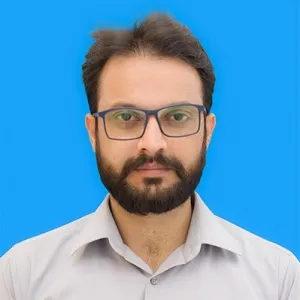Introduction
I am Mr. Asif Mehmood, Lecturer in the Department of Computer Science at NUTECH University. With over 2 years of experience in both academia, my primary research interests lie in Artificial Intelligence (AI), Machine Learning, and Biometrics. I am passionate about exploring how data-driven models can solve real-world problems, particularly in healthcare and biometrics. My teaching philosophy centers around providing students with a strong theoretical foundation, while also equipping them with practical skills for the evolving tech landscape.
Experience
Lecturer, Department of Computer Science, NUETCH University (June 2023–Present)
-
- Teach undergraduate courses in AI, Machine Learning, and Web Technologies.
- Advising undergraduate students on research projects related to image processing and computer vision.
Lecturer, Department of Computer Science, HITECH University (Sep 2022– June 2023)
-
- Taught undergraduate courses in Programming, Mobile Application Development, and Web Engineering.
- Advising undergraduate students on research projects related to medical imaging.
Research Associate, HITECH University (Jan 2022– June 2022)
-
- Research work in machine learning and artificial intelligence of the topic of Human Gait Recognition.
- Developed and proposed new solutions as a proof of concept and conduct research reviews on the state of the art in the field.
Qualification
- Academia:
- Ph.D. in Computer Science, Comsats University Islamabad, Wah (In progress)
- M.S. in Computer Science, Comsats University Islamabad, Wah (2020)
- B.Sc. in Computer Science, University of Wah (2017)
I have published various peer-reviewed papers in top-tier journals and conferences, such as the Pattern Recognition Letters, PLOS ONE, Future Generation Computer Systems and the International Conference on Emerging Trends in Electrical, Control, and Telecommunication Engineering (ETECTE). I also serve as a reviewer for several prominent academic journals in the field of AI and Machine Learning.
Taught Courses
I have taught a variety of undergraduate courses in the Computer Science Department. Below are the courses I have been involved in teaching:
- Programming Fundamentals (CS120)
An introductory course focusing on programming concepts using C++, covering topics such as variables, control structures, functions, and basic data structures.
- Programming Fundamentals Lab (CS121)
A basic course focusing on practical implementation of programming concepts using C++, covering topics such as variables, control structures, functions, and basic data structures.
- Data Structures and Algorithms Lab (CS211)
A core course that covers fundamental data structures (e.g., arrays, linked lists, trees, graphs) and algorithmic techniques (e.g., sorting, searching, recursion) with a focus on computational complexity.
- Artificial Intelligence (CS3501)
A course covering the principles and techniques of AI, including search algorithms, knowledge representation, reasoning, machine learning, and robotics.
- Artificial Intelligence Lab (CS3501)
A course based on the practical implementation of the principles and techniques of AI, including search algorithms, knowledge representation, reasoning, machine learning, and robotics.
- Digital Image Processing (CS4111)
An advanced course that explores the techniques and algorithms used in computer vision, including image processing, feature extraction, object recognition, and deep learning models for visual data.
- Web Technologies (CS4311)
A course based on the designing and development of Web Applications with the help of advance tools (e.g., HTML, CSS, JavaScript, Node.js, Bootstrap)
Research
My research focuses on the intersection of machine learning, image processing, and computer vision. I am currently working on several projects that apply AI techniques to biometrics, such as developing algorithms for automated authentication and recognition.
Ongoing Research Projects:
-
-
- AI for early-stage skin cancer detection using computer vision
- Human Gait Recognition using deep learning.
Publications:
- Mehmood, A., Khan, M. A., Sharif, M., Khan, S. A., Shaheen, M., Saba, T., ... & Ashraf, I. (2024). Prosperous human gait recognition: An end-to-end system based on pre-trained CNN features selection. Multimedia Tools and Applications, 1-21.
- Khan, M. A., Kadry, S., Parwekar, P., Damaševičius, R., Mehmood, A., Khan, J. A., & Naqvi, S. R. (2021). Human gait analysis for osteoarthritis prediction: A framework of deep learning and kernel extreme learning machine. Complex & Intelligent Systems, 1-19.
- Mehmood, A., Tariq, U., Jeong, C. W., Nam, Y., Mostafa, R. R., & Elaeiny, A. (2022). Human gait recognition: A deep learning and best feature selection framework. Comput. Mater. Cont, 70, 343-360.
- Khan, M. A., Mehmood, A., Kadry, S., Almujally, N. A., Alhaisoni, M., Balili, J., ... & Alqatani, A. (2023). TS2HGRNet: a paradigm of two stream best deep learning feature fusion assisted framework for human gait analysis using controlled environment in smart cities. Future Generation Computer Systems, 147, 292-303.
- Mehmood, A., Amin, J., Sharif, M., & Kadry, S. (2024). Human Gait Recognition by using Two Stream Neural Network along with Spatial and Temporal Features. Pattern Recognition Letters, 180, 16-25.
- Mehmood, A., & Mishra, B. (2021). A survey on various unimodal biometric techniques. Sparklinglight Transactions on Artificial Intelligence and Quantum Computing (STAIQC), 1(1), 23-35.
- Mehmood, A., Amin, J., Sharif, M., Kadry, S., & Kim, J. (2024). Stacked-gait: A human gait recognition scheme based on stacked autoencoders. PloS one, 19(10), e0310887.
- Gait-Net Model for Human Gait Recognition based on LSTM and Convolutional Neural Network (Submitted)
- Gait-VIT-16B: Vision Transformer Model for Human Gait Recognition based on Transfer Learning (Submitted)
- Gait-CNN21: A Two-Phase Human Gait Recognition Technique for Frontal View Analysis (Accepted)
Projects
Document Clustering Search Engine (2017): Developed web search engine based on documents clustering.
